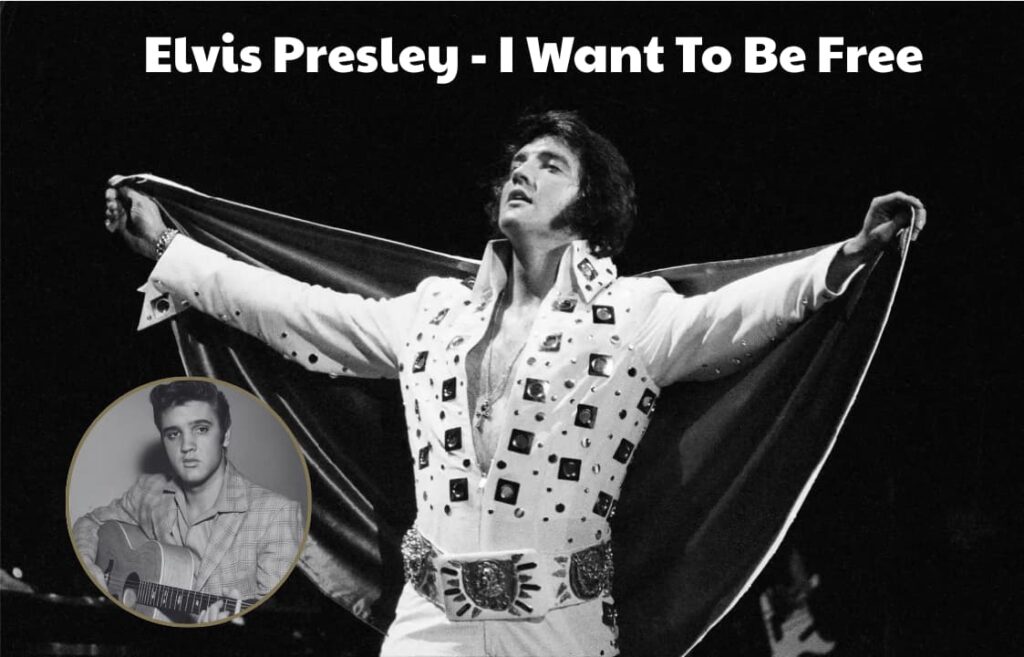
“I Want To Be Free”: A Cry for Freedom Beyond the Silver Screen
Ah, the 1950s. A time of burgeoning rock and roll, drive-in movies, and the electrifying rise of a young man from Tupelo, Mississippi, who would forever change the landscape of popular music. We’re talking, of course, about Elvis Presley, the King himself. But beyond the gyrating hips and the screaming fans, there were moments of surprising vulnerability and depth in his early career, none more poignant perhaps than the song we’re revisiting today: “I Want To Be Free.”
While not one of his chart-topping behemoths like “Hound Dog” or “Heartbreak Hotel,” “I Want To Be Free” held a significant position in the Elvis discography, appearing on the soundtrack for his second film, “Jailhouse Rock,” released in 1957. Though it wasn’t a standalone single, the entire “Jailhouse Rock” EP (Extended Play), which featured four songs from the film including this gem, soared to the top of the Billboard EP chart, holding the number one spot for 28 weeks. The title track, “Jailhouse Rock,” of course, became a massive hit, reaching number one on the Billboard Hot 100. This meant that “I Want To Be Free,” nestled within that hugely successful release, found its way into countless homes and onto countless turntables, becoming an understated but deeply felt part of the Elvis phenomenon for millions of fans. It provided a stark emotional contrast to the rock-and-roll exuberance that often defined his public persona, offering a glimpse into a more reflective, perhaps even melancholy, side of the nascent superstar.
The story behind “I Want To Be Free” is intrinsically linked to its cinematic home. In “Jailhouse Rock,” Elvis plays Vince Everett, a young man who finds fame and fortune through his music after serving time in prison. The song itself is performed by Vince while he’s still incarcerated, a raw, heartfelt plea for release, not just from physical confinement, but from the emotional shackles that bind him. It’s a moment of quiet introspection amidst the film’s more boisterous musical numbers. Imagine, if you will, the audience in 1957, perhaps swept up in the youthful rebellion Elvis embodied, suddenly confronted with this earnest, almost somber, ballad. It was a subtle yet powerful shift in tone, showcasing Elvis’s ability to convey deeper emotions beyond his electrifying stage presence.
At its core, “I Want To Be Free” is a universal anthem of longing for liberation. It speaks to the innate human desire to break free from constraints, whether they be physical walls, societal expectations, or even the confines of one’s own past. For Vince Everett, it’s a literal cry from a prison cell. But for the listener, particularly those of us who have weathered a few more storms in life, the meaning resonates on a much deeper level. It evokes memories of times we felt trapped, yearning for escape, for a fresh start, for the simple dignity of self-determination. The lyrics, though seemingly straightforward, carry a heavy emotional weight: “I want to be free, free from all your lies, you’re the one who taught me to despise.” It’s a lament, a protest, and a declaration all rolled into one. It speaks to betrayal, disillusionment, and the yearning for an authentic existence, unburdened by the deceit or manipulation of others.
Listening to it now, decades later, the song takes on an almost elegiac quality. It’s a reminder of a younger Elvis, still finding his voice, still navigating the whirlwind that his life had become. One can almost hear a whisper of his own struggles within the lyrics, a subtle yearning for a freedom that, despite his immense fame, might have remained elusive. The gentle, almost mournful melody, coupled with Elvis’s tender yet powerful delivery, creates an atmosphere of introspection and quiet despair that is rarely associated with his more boisterous hits. It’s a song that invites us to pause, to reflect on our own journeys, and to remember the moments when we, too, yearned to be truly free. It’s a testament to the enduring power of music to capture the human condition, even in the most unexpected of places. And for those of us who grew up with Elvis as the soundtrack to our youth, it’s a poignant reminder of the multifaceted talent of a true icon.